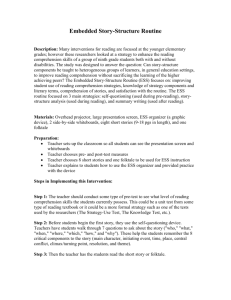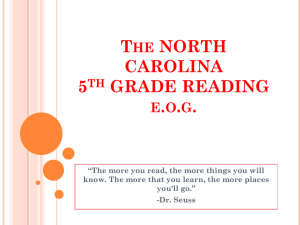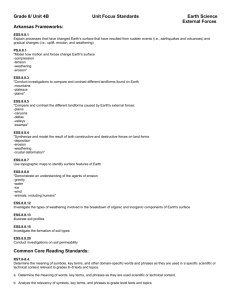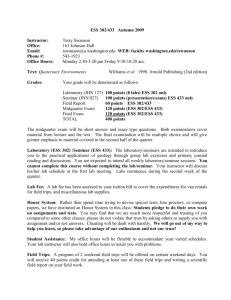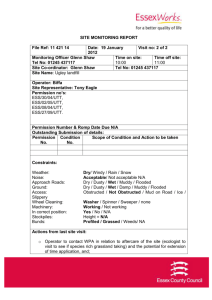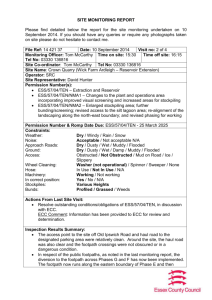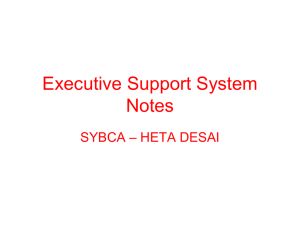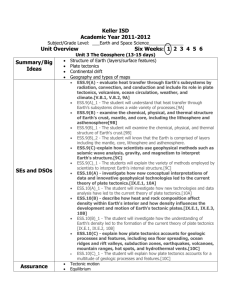Developing Materials for L2 Science Learners
advertisement
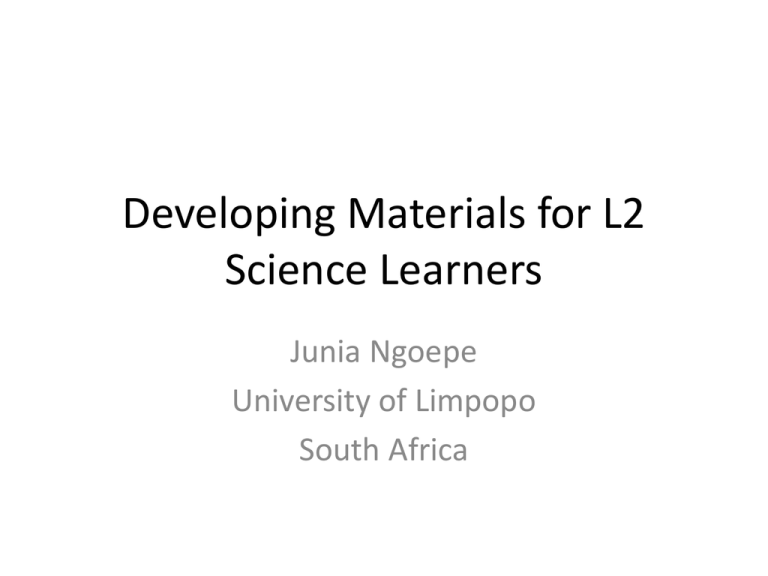
Developing Materials for L2 Science Learners Junia Ngoepe University of Limpopo South Africa Outline • Goal(s) • Students Background • Teaching Team • Curriculum • Organisational Matters • Course Content • Materials Introduction • Previously disadvantaged English second language science learners at University of Limpopo (UL) need support. • This can be in the form of specific materials for these students who have shown potential to succeed in Maths and the Sciences. Programme Goal • Bachelor of Science Extended Degree Programme (BSc EDP) as known as UNIFY • The long-term goal is to enable more black students to enter a science-based programme to make a good start with degree-level work • This will lead to more graduates in the fields of Natural Sciences, Pharmacy, Optometry, Medical Sciences and Agriculture English & Study Skills (ESS) Goal(s) • The students’ academic and general proficiency in English should improve • They should acquire language and study skills which will enhance their academic performance in Mathematics and the Sciences Students’ Background • They are at the threshold of studying at university • Obtained a National Senior Certificate (NSC) qualification • Have passed NSC General English (GE) • But did not qualify to be admitted into the Science faculty at the University of Limpopo (UL) • They have shown potential to succeed in the sciences • They are L2 speakers of English Student Background (Cont.) • English is the language of tuition at UL • They are taught science in English • They have been educationally disadvantaged • Had inadequate access to educational services and opportunities to develop their full potential as students in Mathematics and the Natural Sciences • Most will be first generation university graduates in their families Teaching Team • Made up of language and content lecturers • Local and expatriate staff, at inception • Qualified local teachers have taught at NSC level before • Locals qualify to teach at University ( M & D levels) • Language lecturers have some science background • Expatriates experienced in science education matters • Locals needed training in science education Curriculum • Biology, Chemistry, Mathematics, Physics & ESS, and Computer Literacy • Programme curriculum is interdisciplinary in nature • ESS is an intensive pre-study course (i.e. foundation) in an English – medium institution • Course starts with a diagnostic test • There are contact sessions and tutorials & practicals are included e.g. Project Some Organisational Matters • Experienced expatriate staff • Accelerated staff development programme for locals • Weekly sectional meetings for teaching progress as well as materials development • Occasional content interdisciplinary meetings • Marks’ board at end of every term to monitor student progress Some Organisational Matters ( Cont.) • Mainly learner-centred approach • BSc EDP sticks to teaching 150 students on average • 5 groups of 30 students in each of the 5 core subjects • 5 contact periods per group per week • ESS compulsory & non-repeat • Double-marking practised e.g. Biology and English ‘Woodlice experiment’ Course Content • ESS focuses on techniques and skills needed by students to become efficient and affective learners • These skills include reading and interpretation as well as writing and expression skills • The course also covers aspects of grammar which are of particular relevance to scientists or which have been identified as areas of weakness in students’ writing. Course Content (Cont.) • Emphasis is also placed on the writing of clear, straightforward and grammatically correct sentences, and putting them together to make a cohesive whole • ESS also endeavours to encourage both writing and verbalisation of concepts taught in other sections Materials • Materials are potential tools for learning and are supposed to be generators of lively intellectually engaging activities (Pinto da Silva, 1993: 40) Materials (Cont.) • The ultimate objective is that the materials used as well as the tasks performed should replicate what usually takes place beyond the classroom boundaries (Ahellal, 1990: 38) Materials (Cont.) • Lecturers should continually be concerned with asking themselves whether their materials are producing the results they intend to achieve • If not, how can they improve or replace them Materials (Cont.) • ESS science materials could be characterised by appropriacy, authenticity and be prepared in-house • They are also a combination of internationally – and locally produced materials ESS Materials • 5 study notes • Reference materials • Adapted for cohorts of students Study Manuals • Grammar and Word Classes Module • Writing Module 1 • Writing Module 2 • Readings Comprehension (Science Readings) Passages • Listening Comprehension and Minilectures booklet Grammar & Word Classes Module 8 Units: • • • • Singular & Plural Form of the Verb The Impersonal Scientific Style – The Passive Modality Word Classes Grammar & Word Classes (Cont.) • • • • • Countable & Uncountable Nouns Using the Dictionary to Find Meanings Linking Devices General & Specific Sentences Supplementary Exercises Writing Module 1 5 Units • Cause & Effect • Quantity & Comparison • Relationships • Describing Structure, Content & Function • The Passive 2 Writing Module 2 2 Units • Describing Graphs • Note-taking & Note-making Reading Comprehension Passages 14 Science Readings (include questions/tasks) • Energy and related problems in Malawi • The motor car and pollution • Sick miners pay full price for gold • Wake-up call for world’s health • The rise and rise of Pakistan’s people Reading Comprehension Passages (Cont.) • Contraception for elephants – a viable option? • The world’s food • Pollution and lung cancer • Back to the days of deadly smock • Will it get any worse? Reading Comprehension Passages (Cont.) • Less is more • Lead blights the future of Africa’s children • Greenhouse gases and the global warming trend • The social costs of excessive alcohol consumption Listening Comprehension Minilectures • These lectures are for note-taking practice • The lecturer simulates a lecture while students take notes • Mini – lectures are ‘The Field Trip, Energy, The Noble Gases, The Preservation of Food’, etc. • Students do pertinent exercises pre- or post mini-lectures attendance Reference Materials The following reference materials complement study materials • The Oxford Paperback Thesaurus • Longman Dictionary of Contemporary English • Oxford Dictionary of Science • Practical English Student’s Edition Usage, International Reference Materials ( Cont.) • UNIFY Student Handbook • Periodicals such as ‘New Scientist’ and ‘The Mail and Guardian’ • Websites such as ‘Google’, ‘Yahoo’, ‘Mamma’ and ‘Wikipedia’ Methodology • Students sit for a language of science pre – test • Materials suitable for identified needs are used for the cohort of students • Students sit for a language of science post – test after materials were used • Performance in the 2 tests compared Results • Students perform significantly better in post – test • Specific materials be developed for cohorts of disadvantaged English language students in the sciences • The number of disadvantaged students who succeed in Maths and the Sciences will increase, in the long term Conclusion • If language and content teaching staff work in concert towards improving second language science learners’ proficiency, the number of students who succeed in the sciences will increase. References • AHELLAL, M. 1990. Using Authentic Materials in the Classroom: Theoretical Assumptions and Practical Considerations. English Teaching Forum, 28(2): 37-38. • HUTCHINSON, T. & WATERS, A. 1987. English for Specific Purposes. Cambridge: Cambridge University Press. • JANSEN, J., NTSHINGILA-KHOSA, R. & CRANFIELD, C. 2005. University of the North Mathematics and Science Foundation Year (UNIFY) Phase II. Final (Ex-Post) Evaluation. Unpublished Report. Pretoria: European Union Commission. • NGOEPE L. J. 2007. The University of Limpopo Mathematics and Science foundation year course in English and Study Skills: an evaluation. Potchefstroom: North West University (Thesis – PhD). • PINTO DA SILVA, C.1993. ESP: Back to Methodology. English Teaching Forum, 31(2): 40-41. Thank you Any Questions? junia.ngoepe@gmail.com
